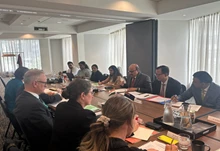
Dr. Jeremy Farrar, the Chief Scientist at the World Health Organization (WHO), has raised alarm over the heightened mortality rate associated with the avian influenza virus, commonly known as H5N1. While the virus primarily affects poultry and ducks, it has evolved into a global zoonotic pandemic, posing a significant threat to human health.
Addressing concerns about potential human-to-human transmission, Dr. Farrar emphasized the urgent need for enhanced monitoring and investigation, particularly in light of recent outbreaks among dairy cows in the United States. He highlighted the importance of understanding the mechanisms by which the virus spreads, including through aerosols generated in milking structures and transportation systems.
The WHO's efforts to mitigate the risk of a global pandemic have been underscored by the announcement of updated terminology for describing airborne pathogens. Following collaborative consultations with major public health agencies, new terms such as "infectious respiratory particles" (IRPs) have been introduced to ensure clarity and consistency in communication among medical professionals and scientists.
Dr. Farrar stressed the significance of this initiative in fostering international cooperation and preparedness against emerging infectious diseases. While acknowledging it as a crucial first step, he emphasized the need for continued scientific research to enhance our understanding of respiratory pathogens and improve infection control measures.
Regarding the development of vaccines for H5N1, Dr. Farrar cautioned that current progress falls short of the necessary level. Moreover, he highlighted the limited diagnostic capabilities of regional and national health authorities, further underscoring the importance of concerted global efforts in combating the threat posed by the virus.
Dr. Farrar's advices serve as a timely reminder of the ongoing challenges posed by avian influenza and the imperative of collective action to safeguard public health.










